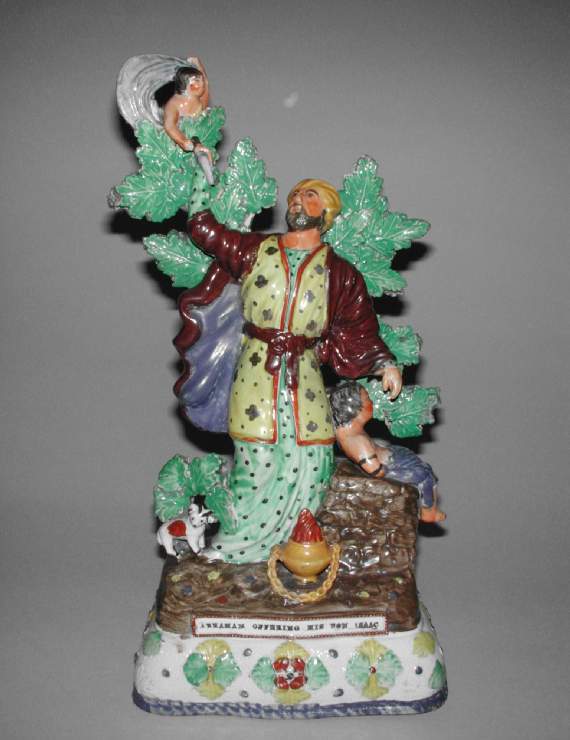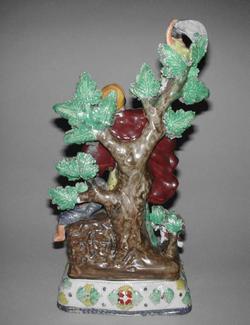Current Location: Gallery 27 (Glaisher)
Titles
The Offering of Isaac
Maker(s)
Production:
Unidentified factory
John Walton
(Possibly)
Entities
Categories
Description
Earthenware, moulded and modelled, lead glazed and painted with polychrome enamels.
Press moulded earthenware figure group with modelled and applied additions. Abraham stands in front of a tree, his right hand held high and holding a knife. Isaac is laid, bound, on a brick altar to his left. There is an angel in a tree behind, his gown swirling above his head as if he has just arrived. In front of Abraham is a burning lamp and by his right foot a small ram, across the brown earth in front ‘ABRAHAM OFFERING HIS SON ISAAC’ is incised on a white ribbon. Abraham wears a green gown, with brown spots, under a long yellow waistcoat decorated with dots and crosses and a flowing brown jacket which lifts under his raised arm to display its blue lining; his figure dominates the group. The scene is set on a high moulded plinth which is decorated with applied floral decoration above a blue band. The back is flattened, but shaped and painted. The underside is deeply recessed, with a central vent hole.
Notes
History note: Bought at a sale in Saffron Walden by Mr Jolley, Bridge Street, Cambridge. Bought from Mr Jolley on 27 January 1910, for £2. 10s (two pounds ten shillings), by Dr J.W.L. Glaisher, Trinity College, Cambridge.
Legal notes
Dr J.W.L. Glaisher Bequest, 1928
Measurements and weight
Height: 37.4 cm
Acquisition and important dates
Method of acquisition: Bequeathed
(1928)
by
Glaisher, J. W. L., Dr
Dating
19th Century, Early
Circa
1825
CE
-
Circa
1830
CE
Note
Bocage figure groups, which feature stylised leafy trees, are often associated with John Walton of Burslem, who is listed in local directories from c.1818-1835. Although Rackham, 1935, suggests this attribution, the distinctive base here does not seem typical and we now know that several potters made figure groups in this style, often copying designs and other features.
Dr Glaisher bought this figure because it was and ‘so extraordinary that the angel should not have been broken off’ and ‘a striking piece [… ] a good specimen of its kind’. However, he also felt ‘colouring is bright but crude and disagreeable and modelling is poor’.
Earthenware figure groups were popular from around 1810, although the earliest examples date from nearly a century before. They were produced by many small potteries and very few are marked. Classical or literary subjects might be copied from more expensive porcelain examples, but scenes from everyday life and topical events were also increasingly popular. These early figure groups are often complex, with modelled and moulded parts and applied decoration; the backs, though flat, are decorated. As demand increased, processes were streamlined to allow cheaper mass production and by the mid 1830s the earlier methods had largely given way to three-part press-moulding. The modelling and colours of this group suggest it dates from towards the end of the earlier period.
The Bible tells that God tested Abraham’s faith by asking him to sacrifice his son. Abraham bound Isaac and raised his knife to kill him. When God saw Abraham had obeyed, He sent an angel to tell him to stop and a ram to sacrifice instead (ref. Genesis 21).
People, subjects and objects depicted
Components of the work
Decoration
composed of
enamels
lead-glaze
Base
Depth 12.5 cm
Width 18.5 cm
Parts
Materials used in production
White earthenware
Techniques used in production
Moulding
: Earthenware, moulded and modelled, lead glazed and painted with enamels.
Inscription or legends present
- Text: ‘ABRAHAM OFFERING HIS SON ISAAC’
- Location: Banner on front of base
- Method of creation: Incised
- Type: Title
- Text: No.3180. Staffordshire group of Abraham sacrificing Isaac b. in Cambridge Jan 27 1910.
- Location: Underside of base
- Method of creation: Rectangular paper label handwritten in black ink
- Type: Label
References and bibliographic entries
Identification numbers
Accession number: C.956-1928
Primary reference Number: 76448
Old object number: 3180
Stable URI
Audit data
Created: Saturday 6 August 2011
Updated: Monday 25 March 2024
Last processed: Tuesday 15 July 2025
Associated departments & institutions
Owner or interested party:
The Fitzwilliam Museum
Associated department:
Applied Arts





